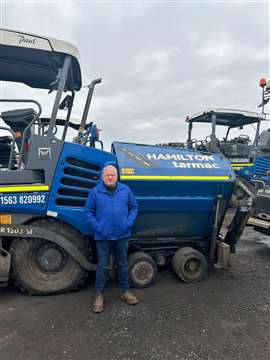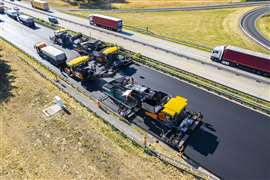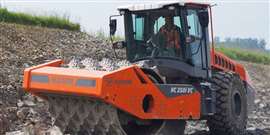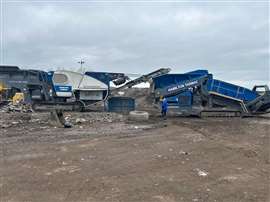Machine uptime: paving the way to profit

Partner Content produced by KHL Content Studio
18 March 2024
Hamilton Tarmac is one of the largest road construction and recycling businesses in Scotland, offering planing and resurfacing services throughout west central parts of the country, from its base in Ayrshire.
 Willie Hamilton of Hamilton Tarmac, with his Wirtgen Group fleet of road construction equipment. Photo: Hamilton Tarmac
Willie Hamilton of Hamilton Tarmac, with his Wirtgen Group fleet of road construction equipment. Photo: Hamilton Tarmac
Founder and managing director Willie Hamilton oversees an operation that includes a large number of pavers, planers and compactors – with enough back-up machines to cover most downtime eventualities.
But he recalls a time when he didn’t have machines to replace any that needed unplanned maintenance. It was then that his relationship with the Wirtgen Group paid dividends.
If a machine developed a fault, says Hamilton, “they’d send engineers out to the jobsite and they would fix it, get it going. That allowed us to get the job finished, then they’d bring the machine in later and do the full repair.”
Hamilton has been buying machines from the Wirtgen Group’s UK subsidiary Wirtgen Ltd for some 25 years and has developed a working partnership with the organisation that has served him well, as his business has grown and evolved.
As Hamilton knows only too well, roadbuilding equipment – be it pavers, milling machines, compaction or crushing and screening equipment – takes a lot of punishment over the course of its working life, with extreme forces acting on it on a daily basis.
The hidden costs of downtime
As parts wear, planned maintenance downtime is an unavoidable fact of life.
Every instance of unplanned downtime, however, is an unforeseen cost that could, in some cases, mean the difference between operating at a profit or at a loss.
Apart from potentially throwing a project off course, unplanned downtime will see workers temporarily unemployed and could mean the painful necessity of having to hire an alternative machine – and with heavy equipment this is rarely an easy thing to do at short notice, given today’s overstretched supply chains.
The situation is also inevitably going to lead to a bill for repairs and possibly new parts that is not within the budget.
Studies have shown that the majority of roadbuilding contractors are not fully aware of the recommended service intervals for their machines, and many will delay servicing for as long as possible.
While this is understandable, especially given current economic challenges, there are sound economic arguments for keeping a close eye on servicing and maintenance requirements and factoring them into work schedules.
 Two InLine-Pave trains from Vögele, working on an orbital road in Berlin, Germany. Photo: Vogele
Two InLine-Pave trains from Vögele, working on an orbital road in Berlin, Germany. Photo: Vogele
When a machine is under warranty, it clearly makes good business to be on top of maintenance, but how important is the relationship between buyer and seller, once the warranty is at an end?
Willie Hamilton says of his experience with Wirtgen, “Spare parts are quite expensive. But if there’s a part that fails on a machine and it was a fault, but the machine is out of warranty, they’ll look at it and say ‘well, that part shouldn’t have worn, we’ll give you the part to fix it’.”
Clearly, there can be benefits to a long-term dealer-customer relationship that go beyond the words on a contract.
Specialist and wear parts
As a rule, your machine’s supplier should have rapid access to specialist parts, as well as the expertise you need to optimise the uptime of your equipment.
Unfortunately, as Hamilton says, specialist parts are inherently expensive – they have to be manufactured with precision, which comes at a cost, and are often made only by the OEM that built the machine.
Many buyers believe that if these parts are costly, so will all parts from that supplier.
Paul Holmes, managing director of Wirtgen Ltd, doesn’t see it that way. He says, “Some customers come to us because there’s nowhere else they can get that specialist spare part for, say, a milling machine. We are the only people who make it.
“But when you get to more generic parts, a customer might think that because the specialist part is expensive, a generic part is also going to be expensive, which is not necessarily the case.
 Paul Holmes, managing director of Wirtgen Ltd. Photo: Wirtgen Ltd
Paul Holmes, managing director of Wirtgen Ltd. Photo: Wirtgen Ltd
“With, for example, oils and filters, we look to provide good value and be competitive alongside those specialist components. Our aim is to be a one-stop shop for customers.”
The total cost of ownership concept
The case for accessing parts locally from a trusted source is a strong one, but the bottom line for most contractors is going to be the price.
To fully understand the price, however, we need to have a good understanding of the cost of machine downtime.
Taking this notion a step further, adopting a total cost of ownership (TCO) approach – not only for machines, but also for individual components – has the potential to lead to long-term benefits for your business.
It’s fair to say that buying generic components today has never been easier, with a basic Google search bringing up a range of wear part options for most road construction machines.
These parts can be ordered and delivered relatively quickly and you will likely have the skills in-house to fit them and get your machine back on the road.
It is highly likely, however, that the lifespan of these components will be limited, compared with parts designed and manufactured to the same exacting standards as your original machine.
Taking the scenario a step further, when purchasing third-party parts becomes standard procedure, the likelihood of unplanned downtime increases, associated costs increase and the reliability of the machines in your fleet becomes questionable.
Embracing the total cost of ownership concept shifts the emphasis from initial cost considerations to factors such as quality, longevity, efficiency and longer service intervals – basically encouraging a holistic assessment of equipment that goes beyond the purchase price.
Perils of deferred maintenance
 Hamm’s new HC 250i C VC compactor for crushing and compacting stone. Photo: Wirtgen Group
Hamm’s new HC 250i C VC compactor for crushing and compacting stone. Photo: Wirtgen Group
Every case of unplanned downtime is unique, but it’s not hard to imagine that a machine failure, due to deferred maintenance, could cost up to ten times the price of the maintenance itself.
Perhaps most importantly, unplanned downtime can cause reputational damage, potentially leading to contract termination and even loss of future work.
It may seem obvious, but surprisingly few contractors take steps to maintain uptime, including listing all equipment and each machine’s routine maintenance requirements.
Even fewer train employees in the basic maintenance of machines and a worryingly small number create a schedule for maintenance and stick to it.
Working with your local supplier or dealer, who may well offer a maintenance plan, can remove a lot of the pain from this aspect of managing an equipment fleet and significantly boost the uptime of your machines
John Deere, for example, has an Operations Center, which provides a central digital solutions platform to manage entire construction sites – including planning, monitoring, maintenance and analysis.
The system was established to inform customers about the condition of their machines, allowing them to maintain service intervals, as well as maximising uptime and potential sell-on value.
Quality pays dividends
 Hamilton Tarmac has recently introduced new Kleemann crushing and screening equipment to its fleet. Photo: Hamilton Tarmac
Hamilton Tarmac has recently introduced new Kleemann crushing and screening equipment to its fleet. Photo: Hamilton Tarmac
Having an engineering background, Willie Hamilton undertook extensive research on various machines before making the decision to pay more for Wirtgen Group equipment, balancing the higher price against a longer lifecycle and extended uptime.
“The components,” he says, “were all very hardwearing. So, we bought one and never looked back.”
Hamilton’s growing fleet now features equipment from across the Wirtgen Group’s range, including Wirtgen milling machines, Hamm rollers and Vögele pavers, as well as crushing and screening equipment from Kleemann.
As his business has expanded, he has invested in additional models, allowing him to largely avoid downtime issues by always having an identical piece of equipment on standby.
In fact, as well as offering roadbuilding services, Hamilton Tarmac has developed equipment rental services in Scotland.
Hamilton recognises that when heavy equipment is in regular use, wear parts will inevitably need to be replaced.
“The secret,” he says, “is keeping on top of the maintenance.”
He adds that his most recent purchases – a pair of Kleemann screeners – are now three years old and “we’ve never had to put a spanner near them”.
For more information about spare parts for Wirtgen Group roadbuilding equipment, visit www.wirtgen-group.com
STAY CONNECTED



Receive the information you need when you need it through our world-leading magazines, newsletters and daily briefings.
CONNECT WITH THE TEAM








